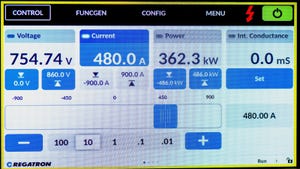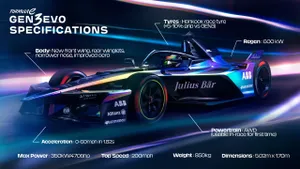As EVs Cut into Fuel-Tax Revenue, Michigan Weighs GPS Alternative
Electrification causes Michigan to consider taxing miles traveled instead of gasoline used.

The impact of the global move to automobile electrification is sending ripples into areas one might not first consider. For example, if I say, “electric vehicles and infrastructure,” the first thing you think of could well be the need for an expanded and improved charging infrastructure. But there’s another important connection between the two terms.
For a good example, we look to the Great Lakes State. In Michigan, money for road upkeep and repair is raised through a tax levied at the gas pump: Currently, each gallon a driver buys is taxed 28.6 cents to that end (plus another six cents for non-road-related uses).
While factions routinely argue over whether the tax rate is too high or too low, the fundamental fairness of the system has seldom been questioned: The more you use the roads, the more gas you buy—and therefore the more you pay to keep those roads in decent condition.
EVs' free ride
But electrification is changing all of that. Battery electric vehicles (BEVs) don’t use gas at all, and hybrid-electrics use much less of it—but of course, these vehicles still use the roads.
According to statewide news organization Bridge Michigan, the state missed out on an estimated $50 million in revenue between 2019-2021 due to EV use. “Michigan now generates about $1.5 billion in annual fuel tax revenue to help fund road repairs,” Bridge Michigan reports.” But because of electric vehicle adoption, experts project the state could lose a third of that money, $500 million, per year by 2030.”
In response, Michigan officials are actively exploring a potential shift from conventional gas taxes to innovative “usage charges” due to the anticipated impact of the auto industry's transition to electric vehicles on road repair tax revenues. The recently enacted $82 billion budget, championed by Gov. Gretchen Whitmer, reinforces ongoing endeavors to investigate an intriguing alternative: replacing the traditional per-gallon gas tax with a system that charges motorists based on the miles they drive.
Michigan's proactive approach involves allocating over $5 million, including $2.6 million from a federal grant secured within the budget, for a comprehensive study. This study, scheduled for this fall, will encompass surveying 20,000 Michiganders to assess the potential implications of a road usage charge mechanism, according to Bridge Michigan. Among the factors examined, the survey will gauge public willingness to embrace GPS technology for mileage recording within their vehicles.
Wherever you go, there we are
It's worth spelling out here that using GPS tech is a better solution than tying a tax simply to odometer clicks: The latter would count every mile whether the vehicle was in the state or else driving in other states. However, it will be interesting to see how Michiganders respond to the idea of having the state government (or any authority) track their movements: One can anticipate concerns about misuse of the information and invasion-of-privacy fears being raised over the fact of a built-in GPS system in the car—even though anyone with a smartphone is already GPS-enabled.
Additionally, the budget mandates that the Michigan Department of Transportation (MDOT) seek federal grant funding for a national “motor vehicle per-mile user fee pilot program,” to be enabled through the $1 trillion infrastructure bill enacted by President Joe Biden in late 2021. In the event of receiving the grant, Michigan is mandated to employ it for launching a pilot program to ascertain the viability of road usage charges as a substitute for traditional motor fuel taxes for funding transportation initiatives, as stipulated by the newly enacted state law.
Michigan is also reportedly studying road usage charge programs implemented in other states, such as Oregon, Utah, and Virginia. These states have already embraced voluntary mileage-based pilot programs.
About the Author(s)
You May Also Like





